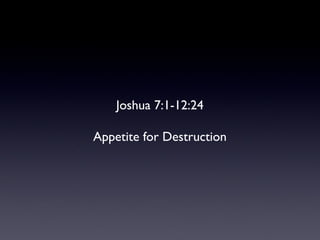Joshua 7-12
- 1. Joshua 7:1-12:24 Appetite for Destruction
- 2. “ He has written a great sermon to rally Israel to the new possibility of salvation, through obedience to the ancient covenant of YHWH, and hope in the new David, King Josiah.” - Frank M. Cross - Frank M. Cross - Frank M. Cross
- 3. A Brief History of (Supposed) Biblical Time
- 4. Book of Joshua - History or What? - Importance of Dtr - Importance of Narrator
- 5. Josiah and the Dtr - Reflection on of Dtr - Re-Conquering of Israel -Connections to Joshua
- 6. Ã˝
- 7. Postcolonial Critical Objections to Historical Model
- 8. Joshua and the Dtr
- 9. Major Themes Narrator’s Omnipotence and Disclosure Parallels and Narrative Structures Etiologies National and Class Distinctions Josiah’s Shadow
- 11. Ai, Achan, and Parallels
- 12. Narrative Components Narrator’s Omnipotence Corporate Guilt Process of Judgement and YHWH’s Power Reflection of Josiah’s Reforms
- 13. Ch. 7: Elimination of Achan
- 14. 8:1-29, Ai Destroyed
- 15. 8:30-8:35, Mt. Ebal Interlude
- 17. Main Themes Narrative History Etiology Fractured Canaanite Society Tribes vs Kings Deuteronomistic Idealizations
- 18. Chapter 10: The South
- 19. Parallels in Structure War Oracle from YHWH (10:8, 11:6) Joshua Attacks by Surprise (10:9, 11:7) YHWH On Israel’s Side (10:10-14, 11:8) Joshua Kills Kings, Destroys Towns (10:16-39, 11:10-15) Summary of Destruction (10:40-43, 11:16-20)
- 20. Parallels in Themes Struggle Against Highlanders Struggle Against Lowlanders
- 23. Take Aways Holy War and Modern Sensibilities Central Authority Class Wars History and Narrative
- 25. History Written by the Victors
- 26. But what is history? And what is the Deuteronomistic History?
- 28. “ Albrecht Alt and Martin Noth drew the conclusion that these accounts were originally local traditions from the end of the second millennium BCE; their purpose was to explain the settlement of the tribe of Benjamin. Later, a Judean editor would have collected and revised these etiologies, applying to them a pan-Israelite perspective.” - Thomas Romer
- 29. Romer asks... “ Should we speak of a Deuteronomistic ‘movement,’ a Deuteronomistic ‘party,’ or a Deuteronomistic ‘school,’ or are there other terms to be preferred?”
- 30. “ The people of Josiah’s kingdom were unfamiliar with the modern understanding of the nation, and Josiah’s kingdom never developed into one... Is it possible to understand space without applying the discourse of nationalism that equates identity and authority of the land with the centralized power? Is it possible to imagine Josiah in an alternative space from the one constructed by the West?” -Uriah Kim
- 31. “ It is not the historian who stages events, weaving them together to form a plot, but History itself. History is the playwright, coordinating facts into a coherent sequence: the historian narrating what happened is merely a copyist or amanuensis. He is a spectator like anyone else and, whatever he may think of the performance, he does not question the stage conventions.” - Paul Carter, The Road to Botany Bay
- 32. Further Reading Decolonizing Josiah: Toward a Postcolonial Reading of the Deuteronomistic History by Uriah Kim, Sheffield Phoenix, 2005 The So-Called Deuteronomistic History by Thomas Romer, T&T Clark Intl, 2005































